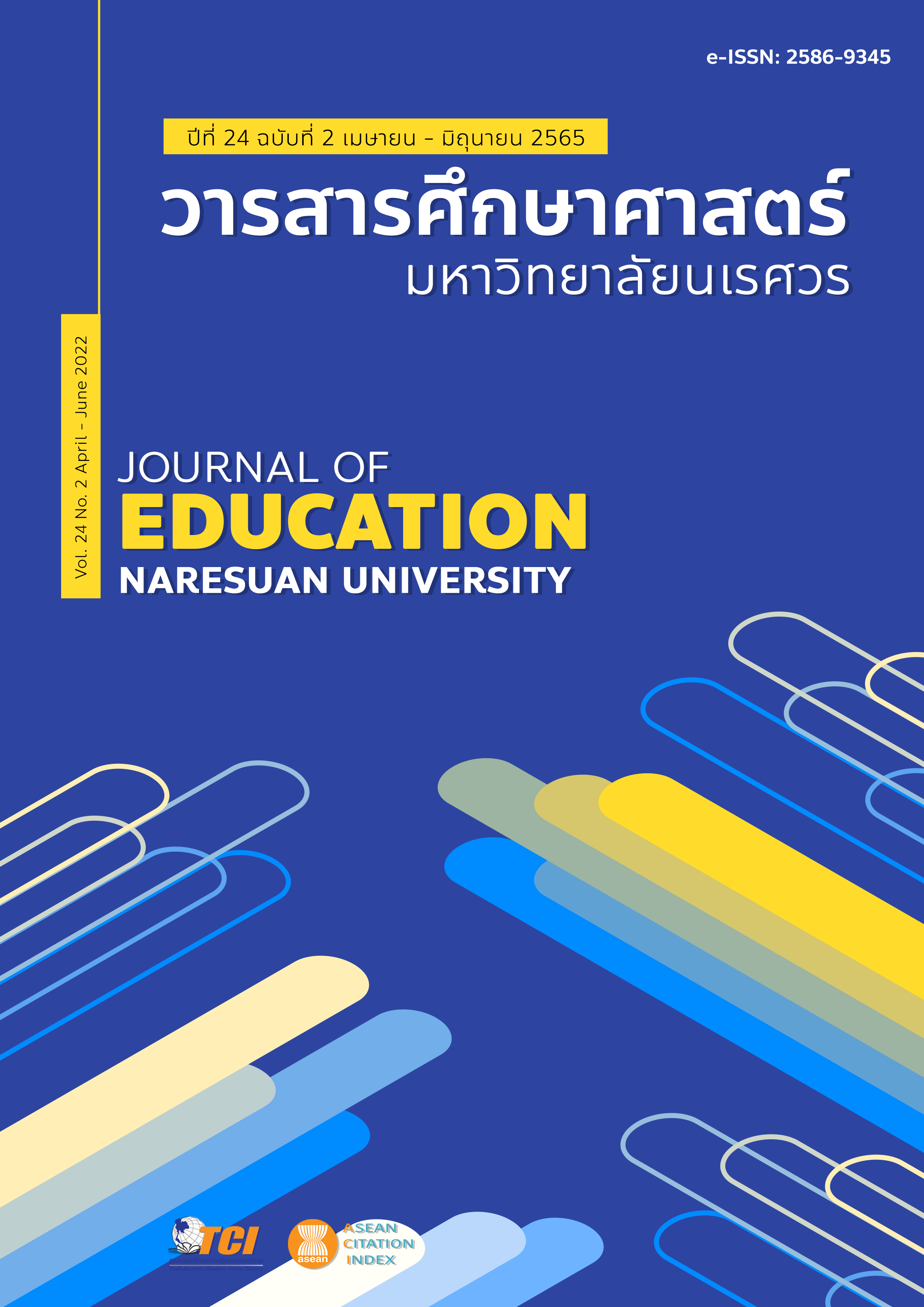A การผลิตสื่อดิจิทัลยุคไทยแลนด์ 4.0 สำหรับรณรงค์การกระทำความผิดเกี่ยวกับคอมพิวเตอร์ของนักเรียนโรงเรียนขนาดเล็กในจังหวัดฉะเชิงเทรา A DIGITAL MEDIA PRODUCTION IN THAILAND 4.0 FOR COMPUTER OFFENSE CAMPAIGN OF SMALL SCHOOL STUDENTS IN CHACHOENGSAO PROVINCE
Main Article Content
บทคัดย่อ
การวิจัยนี้มีวัตถุประสงค์เพื่อ 1) อบรมนักเรียนเรื่องการกระทำความผิดเกี่ยวกับคอมพิวเตอร์ตามพระราชบัญญัติว่าด้วยการกระทำความผิดเกี่ยวกับคอมพิวเตอร์ 2) พัฒนานักเรียนในการผลิตสื่อดิจิทัลยุคไทยแลนด์ 4.0 และ 3) ศึกษาผลการพัฒนานักเรียนในการผลิตสื่อดิจิทัลยุคไทยแลนด์ 4.0 สำหรับรณรงค์การกระทำความผิดเกี่ยวกับคอมพิวเตอร์ กลุ่มตัวอย่าง ได้แก่ นักเรียนชั้นประถมศึกษาปีที่ 4-6 โรงเรียนวัดโพธาราม 30 คน และ โรงเรียนวัดหัวสวน 39 คน เครื่องมือการวิจัย ได้แก่ 1) แบบทดสอบด้านพุทธิพิสัย 2) แบบทดสอบด้านทักษะพิสัย ได้แก่แบบวัดทักษะและแบบประเมินทักษะการผลิตสื่อดิจิทัล และ 3) แบบสอบถามด้านจิตพิสัย สถิติที่ใช้ได้แก่ ค่าความถี่ ร้อยละ ฐานนิยม และ one-sample t-test ผลการวิจัย พบว่า
1. อบรมนักเรียนโดยชมวิดีโอและบรรยายเกี่ยวกับความผิดเกี่ยวกับคอมพิวเตอร์ ตามพระราชบัญญัติว่าด้วยการกระทำความผิดเกี่ยวกับคอมพิวเตอร์ พ.ศ. 2550 และ (ฉบับที่ 2) พ.ศ. 2560
2. การพัฒนานักเรียนในการผลิตสื่อดิจิทัลยุคไทยแลนด์ 4.0 สำหรับรณรงค์การกระทำความผิดเกี่ยวกับคอมพิวเตอร์ โดยใช้โปรแกรม Microsoft PowerPoint และโปรแกรม Animaker รวมเวลาทั้งสิ้นโรงเรียนละ 20 ชั่วโมง
3. ผลการพัฒนาด้านพุทธพิสัย พบว่า นักเรียนตอบข้อคำถามวัดความรู้เกี่ยวกับพระราชบัญญัติว่าด้วยการกระทำความผิดเกี่ยวกับคอมพิวเตอร์ พ.ศ. 2550 และ (ฉบับที่ 2) พ.ศ. 2560 (ชุดที่ 1) ได้คะแนนเฉลี่ย 16.06 (ร้อยละ 80.03 สูงกว่าเกณฑ์ร้อยละ 75) และนักเรียนตอบคำถามวัดความรู้เกี่ยวกับโปรแกรมไมโครซอฟต์พาวเวอร์พอยต์ (PowerPoint) และ โปรแกรม Animaker (ชุดที่ 2) ได้คะแนนเฉลี่ย 14.78 (ร้อยละ 98.55 สูงกว่าเกณฑ์ร้อยละ 80)
4. ผลการพัฒนาด้านทักษะพิสัย พบว่า นักเรียนสามารถผลิตสื่อดิจิทัลผ่านเกณฑ์ประเมินทักษะการผลิตสื่อดิจิทัลตามที่กำหนด จำนวน 10 ทีม จาก 13 ทีม คิดเป็นร้อยละ 86.96
5. ผลการพัฒนาด้านจิตพิสัย พบว่า หลังจากเข้าร่วมกิจกรรมนักเรียนมีจิตพิสัยหรือเจตคติ มีค่านิยมความรู้สึก ความสนใจ และคุณธรรมจริยธรรมที่ใช้เป็นตัวควบคุมพฤติกรรมที่เป็นนิสัยประจำตัวของตนให้ประพฤติปฏิบัติแต่สิ่งที่ถูกต้องดีงาม ซึ่งส่วนใหญ่มีจิตพิสัยอยู่ในระดับจริงที่สุด
Article Details

อนุญาตภายใต้เงื่อนไข Creative Commons Attribution-NonCommercial-NoDerivatives 4.0 International License.
เจ้าของบทความมิได้คัดลอก หรือละเมิดลิขสิทธิ์ของผู้ใด หากเกิดการละเมิดลิขสิทธิ์ ไม่ว่าวิธีใด หรือการฟ้องร้องไม่ว่ากรณีใด ๆ ที่อาจเกิดขึ้นได้ กองบรรณาธิการวารสารศึกษาศาสตร์ ไม่มีส่วนเกี่ยวข้องทั้งสิ้น ให้เป็นสิทธิ์ของเจ้าของบทความที่จะดำเนินการ
เอกสารอ้างอิง
Amosa, I. G, Hamdalat, T. Y., & Sherifat, A. B. (2015). Effectiveness of PowerPoint Presentation on Students’ Cognitive Achievement in Technical Drawing. Malaysian Online Journal of Educational Technology (MOJET), 3(4), 1-12.
Chamnanpet, N., Kijkuakul S., & Nakkhuntod, M. (2019). Using action research to Develop clay animation with mode base teaching to encourage concept Developing in the topic of digestive system. Journal of Education Naresuan University, 21(4), 183-197. [in Thai]
Choochoed, P., & Sakdulyatham, R. (2017). Perception and understanding toward a crime act in compliance with the Computer-related Crime Act B.E. 2560 of General Public in Nonthaburi and Bangkok Province (Research report). Bangkok: Rajapruk University. [in Thai]
Common, B. T. (2013). The role of new digital media in the construction of social values and identity of youths in Bangkok (Research report). Bangkok: Dhurakij Pundit University. [in Thai]
Office of the Council of State. (2007). Computer-related Crime Act B.E. 2550. Bangkok: Office of the Council of State. [in Thai]
Office of the Council of State. (2017). Computer-related Crime Act (No. 2) B.E. 2560. Retrieved from http://www.ratchakitcha.soc.go.th/DATA/PDF/2560/A/010/24.PDF [in Thai]
Garigo, A. (2014). Developing computer learning program entitled “basic presentation program” of career and technology core learning content for 6th grade primary education. Journal of Information Technology Management and Innovation, 1(2), 16- 27. [in Thai]
Maneenin, A. (2017). The development of lesson advanced Microsoft PowerPoint Program about hexadecimal in math for computer subject use to for supplementary teaching for second year students of vocational certificate majoring in business computer. The 8th Hatyai National and International Conference. Songkhla: Hatyai University. [in Thai]
Office of the National Education Commission. (2003). National Education Act B.E. 2542 (1999) and Amendments (Second National Education Act B.E. 2545 (2002). Bangkok: Office of the National Education Commission. [in Thai]
Office of the Basic Education Commission. (2018). Information system for educational administration. Retrieved June 11, 2018, from http://data.bopp-obec.info/emis/school.php?Area_CODE=2401 [in Thai]
Sakdulyatham, S. (2008). Knowledge, impact assessment and behavior tendency of internet users about the Computer Crime Act B.E. 2550 (Master thesis). Bangkok: Chulalongkorn University. [in Thai]
Sekkhunthod, S. (2016). The Data Analysis using Statistical and Research packages software. Bangkok: Triple Group. [in Thai]
Sriked, P. (2013). Problems of law enforcement on computer-related offenses and punishment of offenders with Thai children and youth. Pathumthani University Academic Journal, 5(3), 1-12. [in Thai]
Suwan, S., Jumsai na Ayudhaya, S., & Wannagatesiri, T. (2015). Development of multi-lateral cooperation for educational quality improvement of small-size schools in Nakhon Pathom Province (Research report). Nakhon Prathom: Faculty of Education and Development Sciences, Kasetsart University Kamphaeng Saen Campus. [in Thai]


